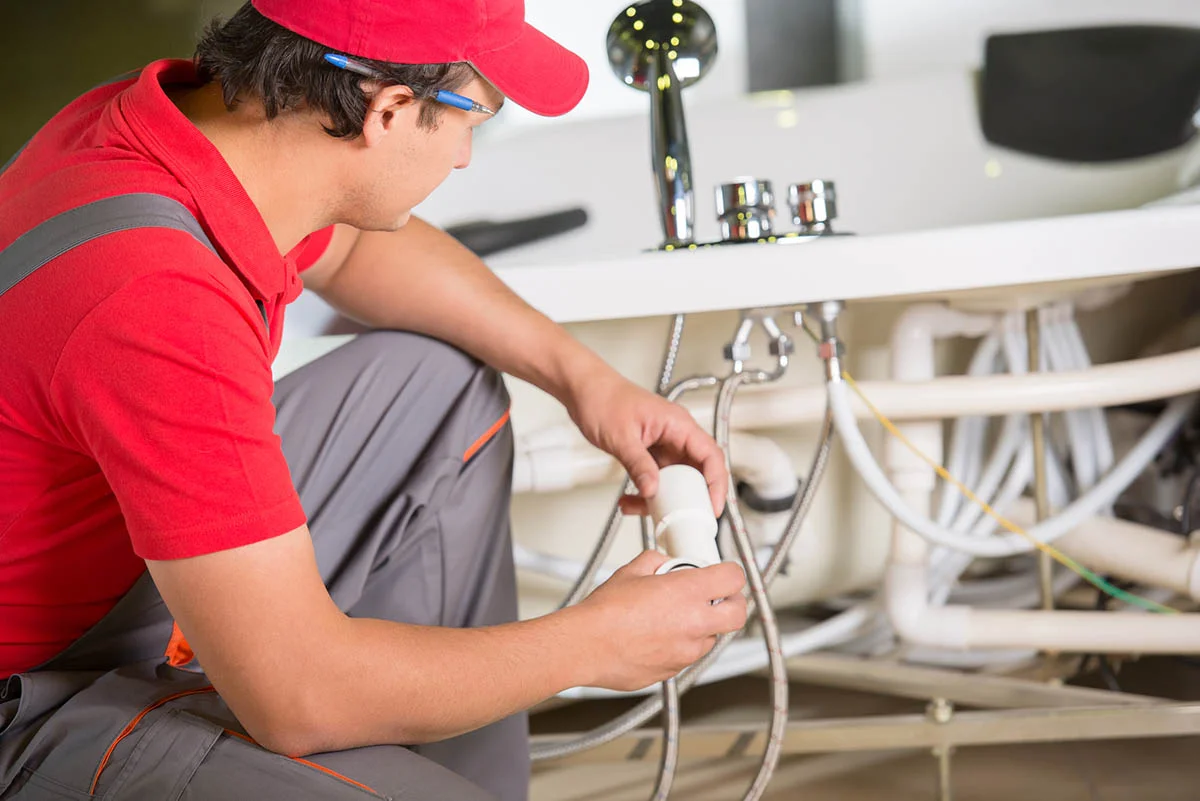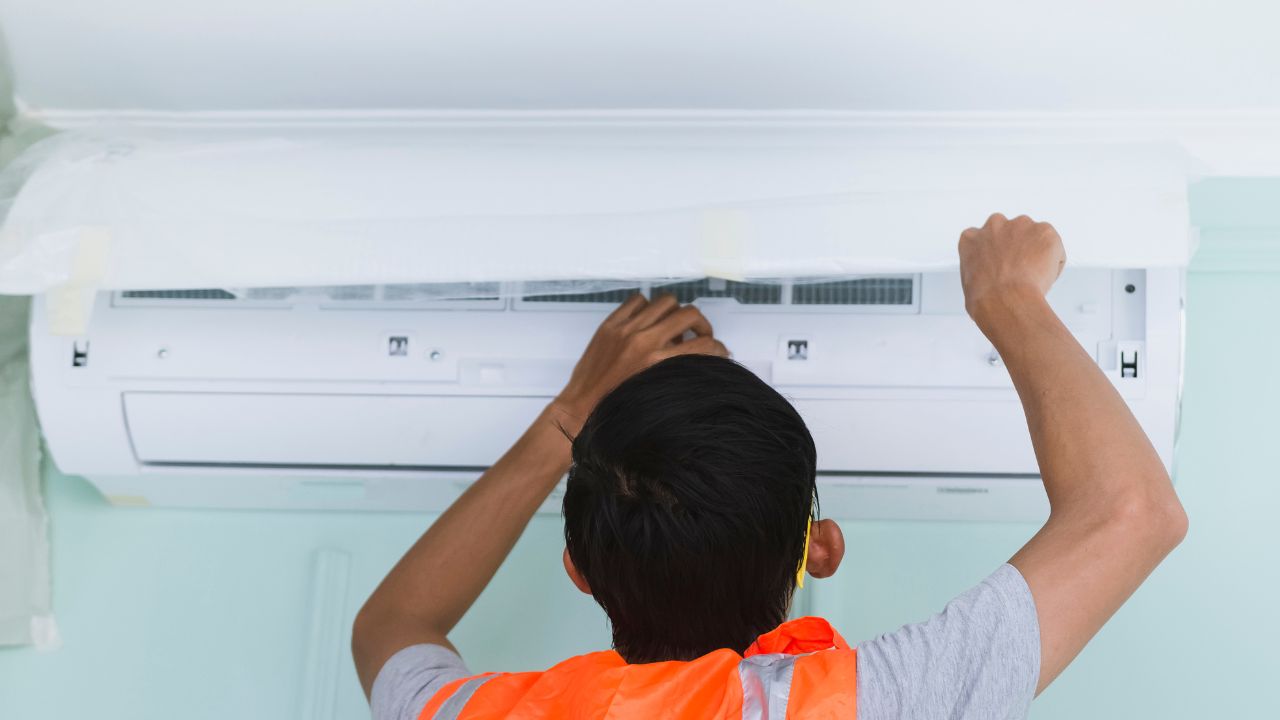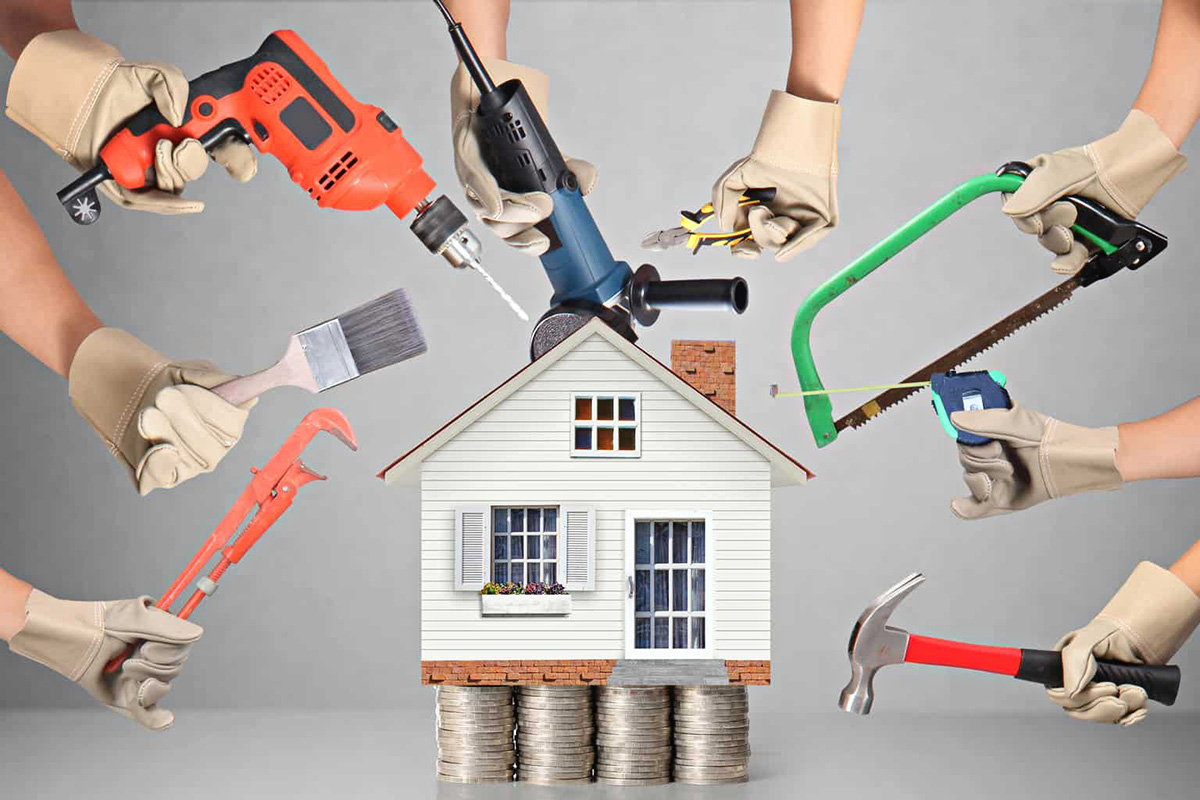Home>Home Maintenance>How To Find Home Repair Companies


Home Maintenance
How To Find Home Repair Companies
Modified: March 6, 2024
Looking for reliable home repair companies? Learn how to find the best experts for all your home maintenance needs. Find trusted professionals in your area.
(Many of the links in this article redirect to a specific reviewed product. Your purchase of these products through affiliate links helps to generate commission for Storables.com, at no extra cost. Learn more)
Introduction
Keeping your home in good repair is essential for maintaining its value and ensuring the safety and comfort of your family. However, not all of us are skilled in home maintenance tasks or have the time and resources to do it ourselves. That’s where home repair companies come in. These companies specialize in providing professional services to address a wide range of home maintenance needs, from fixing leaky faucets to remodeling bathrooms.
But with so many home repair companies to choose from, how do you find the right one that meets your specific requirements? In this article, we will explore the factors to consider and the steps you can take to find the best home repair company for your needs.
When it comes to choosing a home repair company, there are several important factors you should consider. First and foremost, you want to ensure that the company is reputable and has a track record of providing quality work. Additionally, you want to select a company that specializes in the type of repairs you need. For example, if you need electrical repairs, you’ll want to choose a company that has experience and expertise in dealing with electrical systems.
Another important factor to consider is the company’s availability and responsiveness. When you have a home repair issue, you want a company that can address it in a timely manner. Make sure to inquire about their availability and ask about their response time for emergency repairs. Additionally, consider the company’s location and whether they can easily access your neighborhood.
Cost is also a significant factor to consider. While you don’t want to compromise on quality, it’s important to find a company that provides fair and transparent pricing. Remember to request quotes from multiple companies and compare their prices and services to ensure you’re getting a competitive rate.
Furthermore, verifying the company’s credentials is crucial. Ensure that the home repair company is licensed and insured. This protects both you and the company in case of any accidents or damages during the repair process. Additionally, check if the company and its employees have the necessary certifications and training to perform the required repairs.
In the following sections, we will delve into the steps you can take to find a reliable home repair company that meets your needs. By following these steps, you’ll be well-equipped to make an informed decision and confidently hire a company that will provide quality repairs for your home.
Key Takeaways:
- Choose a home repair company with a solid reputation, proper licensing, and transparent pricing to ensure quality work and protect your home from liability.
- Gather recommendations, verify credentials, and review contracts before making a final decision to schedule repairs with the chosen company for a smooth and successful home maintenance experience.
Read more: How To Find Jobs For My Construction Company
Factors to Consider When Choosing a Home Repair Company
When it comes to selecting a home repair company, there are several important factors to consider. These factors will help you make an informed decision and ensure that the company you choose is trustworthy, reliable, and capable of meeting your specific needs. Let’s explore these factors in detail:
- Reputation: It’s crucial to choose a home repair company with a solid reputation. Research online and read customer reviews to learn about the experiences of others who have used their services. Look for companies with consistently positive reviews and a history of delivering high-quality work.
- Experience and Expertise: Consider the experience and expertise of the company. Find out how long they have been in business and whether they specialize in the type of repairs you need. A company with years of experience in handling similar repairs will likely have the knowledge and skills to tackle your project effectively.
- Availability and Responsiveness: It’s important to choose a home repair company that is readily available and responsive to your needs. Inquire about their availability and ask how quickly they can address your repair issues. A company that can promptly respond to your requests and provide timely service is invaluable, especially for emergency repairs.
- Location: Consider the location of the home repair company. Choosing a local company has several advantages, such as quicker response times and familiarity with local building codes and regulations. Local companies are also more likely to have established relationships with suppliers and subcontractors in the area, which can facilitate the repair process.
- Insurance and Licensing: Verify that the home repair company is properly licensed and insured. Ask for proof of insurance and ensure that their coverage is up to date. Licensing demonstrates that the company meets certain standards and regulations, while insurance protects you from liability in the event of accidents or damages during the repair process.
- Transparent Pricing: Request quotes from multiple home repair companies and compare their prices. While cost shouldn’t be the sole determining factor, it’s important to find a company that offers fair and transparent pricing. Be cautious of companies that provide significantly lower quotes, as this could indicate subpar quality of work or hidden costs.
- Good Communication: Effective communication is key to a successful home repair project. Choose a company that communicates clearly, listens to your concerns, and keeps you informed throughout the process. A company that values open and transparent communication is more likely to deliver the results you desire.
- References and Portfolios: Ask the home repair company for references from past clients. Contact these references to inquire about their experiences with the company and the quality of their work. Additionally, ask the company to provide a portfolio of their previous projects. This will give you a sense of their capabilities and the level of craftsmanship they can deliver.
By considering these factors, you will be able to evaluate and compare different home repair companies effectively. Take the time to thoroughly research and gather information before making your decision. Remember that the goal is to find a reputable company that can provide high-quality repairs and exceptional service for your home.
Researching and Gathering Information
Once you have identified the factors to consider when choosing a home repair company, the next step is to conduct thorough research and gather information about potential companies. This research will help you narrow down your options and make an informed decision. Here are some effective methods for researching and gathering information:
- Online Search: Begin your research by conducting an online search for home repair companies in your area. Use search engines and online directories to find companies that specialize in the type of repairs you need. Pay attention to the companies’ websites to gather information about their services, expertise, and contact details.
- Review Websites: Visit review websites to learn about the experiences of customers who have used the services of the home repair companies you are considering. Look for websites that provide authentic and unbiased reviews. Pay attention to both positive and negative feedback to get a well-rounded view of each company’s strengths and weaknesses.
- Ask for Recommendations: Reach out to friends, family, neighbors, and colleagues who have recently had home repairs done. Ask them about their experiences and if they can recommend any reliable and reputable home repair companies. Personal recommendations are often valuable as they come from trusted sources.
- Check Better Business Bureau (BBB): Visit the Better Business Bureau website and search for the home repair companies you are considering. The BBB provides ratings and reviews based on customer feedback and complaints. Look for companies with high ratings and positive reviews, as this indicates a good track record of customer satisfaction.
- Online Forums and Social Media: Participate in online forums or social media groups related to home maintenance and repairs. Ask for recommendations and gather insights from community members who have firsthand experience with home repair companies in your area. These platforms can provide valuable information and help you make informed decisions.
- Professional Associations: Check if the home repair companies you are considering are members of any professional associations or trade organizations. Membership in these associations often indicates a commitment to quality work and adherence to industry standards. Additionally, these organizations may provide resources or guidelines to help you evaluate the companies.
During the research process, keep track of the information you gather for each company. Create a spreadsheet or a document to compare their services, expertise, availability, and customer reviews. This will help you make an objective evaluation and narrow down your choices based on your specific requirements.
Remember, investing time in researching and gathering information will pay off in the long run. By conducting a thorough investigation, you’ll be able to identify reliable and reputable home repair companies that align with your needs and expectations.
Getting Recommendations from Others
When it comes to choosing a reliable home repair company, recommendations from others can be a valuable source of information. Getting input and feedback from people who have had firsthand experience with different companies can help you make an informed decision. Here are some effective ways to get recommendations from others:
- Ask Friends, Family, and Neighbors: Reach out to your network and ask for recommendations. Friends, family members, and neighbors who have recently had home repairs done can provide valuable insights into their experiences with various companies. They can tell you about the quality of work, reliability, and overall satisfaction with the services they received.
- Participate in Online Communities: Join online forums, social media groups, and community platforms related to home maintenance and repairs. Engage in discussions and ask for recommendations from community members who have faced similar repair issues. Online communities provide a wealth of knowledge and firsthand experiences that can help you find trustworthy home repair companies.
- Local Homeowners Associations: Reach out to your local homeowners association or neighborhood group. These organizations often have a wealth of information about reputable home repair companies that have provided services to other residents. They may also have a list of preferred vendors or contractors with positive reviews and track records within the community.
- Professional Networks: If you are a part of any professional networks or associations, such as real estate groups or trade organizations, seek recommendations from fellow members. These professionals often have experience working with various home repair companies and can provide valuable insights into their expertise, reliability, and customer service.
- Online Review Websites: Visit online review websites and look for home repair companies with consistently positive feedback from customers. These websites allow users to rate and review companies based on their experiences. Pay attention to companies with high ratings and positive reviews, as this indicates a track record of customer satisfaction.
- Check with Local Hardware Stores: Local hardware stores often have connections with reputable home repair companies. They may have a list of trusted contractors or be able to recommend companies that frequently serve their customers. These recommendations can be particularly valuable, as hardware stores have firsthand knowledge of the quality of work and professionalism of the recommended companies.
When seeking recommendations, it’s important to gather a diverse range of opinions and experiences. Consider the specific needs of your repair project and evaluate the recommendations based on factors such as reputation, expertise, reliability, and customer reviews. It’s also a good idea to do additional research on the recommended companies to ensure they align with your requirements.
By tapping into the knowledge and experiences of others, you can make a more informed decision when selecting a home repair company. Take the time to follow up on recommendations and gather as much information as possible to find a company that meets your needs and delivers quality repairs for your home.
Checking Online Directories and Review Websites
When searching for a reliable home repair company, online directories and review websites can be valuable resources. These platforms provide a convenient way to gather information, compare options, and read feedback from customers. Here are some steps to effectively use online directories and review websites in your search:
- Research Popular Online Directories: Start by exploring popular online directories specific to home repair services. Websites like Angie’s List, HomeAdvisor, and Yelp provide comprehensive listings of home repair companies along with customer reviews and ratings. These directories often allow you to filter results by location, services offered, and customer ratings for easier evaluation.
- Read Customer Reviews: Once you have identified potential home repair companies on the directories, take the time to read customer reviews. Pay attention to both positive and negative reviews to gain a balanced perspective. Look for consistent feedback regarding the quality of work, professionalism, responsiveness, and overall customer satisfaction.
- Consider Criteria for Evaluation: Develop a set of criteria to evaluate the companies based on the reviews. Consider factors such as the number of positive reviews, the overall rating, the level of detail provided in the reviews, and any trends or recurring themes in the feedback. This will help you assess the reputation and reliability of the companies.
- Look for Verified and Trustworthy Reviews: Some online directories and review websites have measures to verify the authenticity of customer reviews. Look for indicators like verified purchase or verified user badges next to the reviews, as these indicate a higher level of reliability. Be wary of reviews that seem excessively positive or negative without substantial explanation, as they may be biased or unreliable.
- Check the Company’s Profile: Explore the profiles of the home repair companies on the online directories. Look for information about their services, experience, certifications, and contact details. Verify that the companies specialize in the type of repairs you need and have the necessary expertise to handle your specific project.
- Utilize Multiple Review Websites: Don’t rely solely on one review website for information. Explore multiple platforms to gather a more comprehensive understanding of each company. Different websites may have varying ratings and reviews, so comparing information from several sources can give you a more balanced perspective.
- Take Reviews with a Grain of Salt: While reviews are a valuable source of information, it’s important to use them as a guide rather than the sole deciding factor. Keep in mind that opinions can vary, and individual experiences may differ. Use the reviews as one aspect of your evaluation process and consider other factors like the company’s experience, licensing, and insurance.
By checking online directories and review websites, you can gain insights into the reputation, reliability, and customer satisfaction levels of different home repair companies. This information will help you narrow down your options and select a company that aligns with your requirements and expectations.
Remember to keep an open mind and thoroughly evaluate the information you gather. Use online directories and review websites as a starting point in your research, but supplement this information with other sources such as recommendations from others and personal interviews with the companies.
Interviewing and Assessing Potential Home Repair Companies
Once you have narrowed down your list of potential home repair companies, it’s important to take the time to interview and assess them. This step allows you to gather more information about their services, assess their professionalism and expertise, and determine if they are the right fit for your project. Here are some tips for conducting effective interviews and assessments:
- Prepare a List of Questions: Before the interviews, prepare a list of questions to ask each home repair company. These questions may include inquiries about their experience, the types of repairs they specialize in, the estimated timeline for your project, and how they handle any unexpected issues or delays. Having a list of questions ensures that you cover all the necessary topics during the interviews.
- Ask about Experience and Expertise: Inquire about the company’s experience in the home repair industry and their expertise in the specific type of repairs you need. Ask about similar projects they have completed and any specialized certifications or training their employees have. This will help you assess their level of knowledge and expertise.
- Discuss Project Timeline and Availability: Clarify the timeline for your project and ask about the company’s availability to start the work. Inquire about any potential scheduling conflicts or delays that may arise. A reliable home repair company should be able to provide a realistic timeline and demonstrate their commitment to meeting deadlines.
- Verify Licensing and Insurance: Ensure that the home repair company is properly licensed and insured. Ask for proof of licensing and details of their insurance coverage. This will provide you with peace of mind and protect you from any liability in case of accidents or damages during the repair process.
- Discuss Pricing and Payment Terms: Clarify the pricing structure and payment terms with the home repair companies. Obtain detailed quotes for the specific repairs you need and compare them. Inquire about any upfront deposits or payment milestones. Transparent pricing and payment terms are essential for a smooth and satisfactory working relationship.
- Inquire about Warranties and Guarantees: Ask the home repair companies if they offer any warranties or guarantees on their work. A reputable company should stand behind the quality of their repairs and be willing to address any issues that may arise after the completion of the project.
- Assess Communication and Professionalism: Pay close attention to the communication skills and professionalism of the company representatives during the interviews. Are they attentive, responsive, and respectful? Effective communication is crucial for a successful working relationship, so ensure that you feel comfortable and confident in their ability to communicate effectively.
- Request References and Portfolio: Ask for references from past clients and inquire about their experiences with the company. Additionally, request a portfolio of their previous projects to assess the quality of their workmanship. This will give you a sense of the company’s capabilities and the level of craftsmanship they can deliver.
During the interviews, take notes and document your observations and impressions of each company. This will help you in the decision-making process when evaluating and comparing the different options.
By conducting interviews and assessments, you can gather valuable insights and make an informed decision about the home repair company that best fits your needs. Remember to trust your instincts and select a company that not only meets your requirements but also gives you confidence in their ability to deliver high-quality repairs for your home.
When looking for home repair companies, ask for recommendations from friends and family, read online reviews, and check for proper licensing and insurance before hiring.
Verifying Licenses, Insurance, and Certifications
Verifying the licenses, insurance, and certifications of a home repair company is a crucial step in the selection process. It ensures that the company operates legally, follows industry regulations, and has the necessary coverage to protect you and your property. Here are some important aspects to consider when verifying licenses, insurance, and certifications:
- Licenses: Check if the home repair company holds the required licenses to perform the specific repairs you need. Different states and localities have different licensing requirements, so ensure that the company meets the necessary criteria. A licensed company is more likely to comply with industry standards and regulations.
- Insurance: Verify that the home repair company has adequate insurance coverage. This includes general liability insurance, which protects you from any damages or accidents that may occur during the repair process. Additionally, workers’ compensation insurance is important to ensure that you are not held liable if a worker is injured on your property.
- Certifications and Training: Inquire about any certifications or specialized training that the home repair company and its employees hold. These certifications demonstrate a commitment to continuous learning and staying updated with the latest industry practices. Look for certifications from reputable organizations related to the specific repairs you need.
- Verification Process: Request proof of the company’s licenses, insurance, and certifications. This may include documentation such as license numbers, insurance policy details, and copies of certifications. Take the time to verify this information by contacting the relevant licensing authorities, insurance companies, and certification organizations.
- Claims and Liability: Ask the home repair company about their claims process and how they handle any potential liability issues. Understand their procedures for filing claims and resolving disputes, if necessary. A reliable company will have a clear and transparent process in place to address any concerns or issues that may arise.
- Subcontractors: Inquire about the use of subcontractors by the home repair company. If subcontractors are involved, verify that they also hold the necessary licenses and insurance coverage. Ensure that the company takes responsibility for any subcontracts and that they have verified the qualifications and credentials of the subcontractors they work with.
- Reviews and References: Consider reviews and references from previous clients as an additional source of validation. Positive reviews and testimonials can provide reassurance that the company maintains professional standards and adheres to legal and ethical requirements.
Verifying licenses, insurance, and certifications is vital to protect yourself, your property, and ensure that the home repair company operates in a professional and responsible manner. Don’t hesitate to request the necessary documentation and conduct thorough checks to confirm their validity.
By taking the time to verify licenses, insurance, and certifications, you can have confidence that the home repair company you choose is qualified, trustworthy, and adequately covered to handle your project.
Obtaining Multiple Quotes and Estimates
When selecting a home repair company, obtaining multiple quotes and estimates is a crucial step in the decision-making process. It allows you to compare pricing, understand the scope of work, and determine the overall value offered by different companies. Here’s how to effectively obtain multiple quotes and estimates:
- Research and Identify Potential Companies: Begin by researching and identifying several reputable home repair companies that specialize in the type of repairs you need. Consider factors such as their reputation, experience, and customer reviews. Create a shortlist of companies that align with your requirements.
- Contact the Shortlisted Companies: Reach out to the shortlisted companies and provide them with details about your repair project. Be clear and specific about the work you need to be done. Request a written estimate based on the provided information.
- Provide Detailed Information: To ensure accurate quotes and estimates, provide each company with detailed information about the project. This may include measurements, materials required, any specific preferences or requirements, and the desired timeline for completion. The more specific you are, the more accurate the quotes will be.
- Ask for a Breakdown of Costs: When requesting quotes, ask for a breakdown of costs for each item or service included in the estimate. This will help you compare prices and understand what is included in each company’s pricing structure. Pay attention to any additional charges or fees that may apply.
- Compare Prices and Services: Once you receive the quotes and estimates, carefully review and compare them. Pay attention to the pricing, but also consider the level of detail provided, the scope of work, and the timeline for completion. Keep in mind that the lowest price may not always be the best option if it compromises on quality or excludes important services.
- Seek Clarification: If any aspect of the quotes or estimates is unclear, reach out to the companies for clarification. Ask questions about any items that you don’t fully understand or that require further explanation. Clear communication ensures that you have a complete understanding of the costs involved.
- Consider Additional Factors: While price is an important consideration, it should not be the only determining factor. Consider other factors such as the company’s reputation, experience, references, and the level of customer service they provide. A company that offers competitive pricing along with quality work and a positive customer experience may be the best choice overall.
- Negotiate or Request Adjustments: If you have identified a preferred company but their quote is higher than others, consider negotiating the price or requesting adjustments to the scope of work to align with your budget. Some companies may be willing to work with you to find a mutually beneficial solution.
Obtaining multiple quotes and estimates allows you to make an informed decision based on a comprehensive understanding of the pricing and services offered by different home repair companies. It empowers you to select a company that not only meets your budget but also delivers quality workmanship and value for your investment.
Remember, it is important to communicate clearly with the companies and ask for any necessary clarifications to ensure the quotes are accurate and detailed. Take your time to evaluate the quotes and consider all factors before making a final decision.
Reviewing Contracts and Terms of Service
Before finalizing your decision to hire a home repair company, it is essential to carefully review the contracts and terms of service provided by the company. A clear and comprehensive contract protects both parties and ensures that everyone understands their rights, responsibilities, and expectations. Here are some key steps to follow when reviewing contracts and terms of service:
- Request a Written Contract: Ensure that the home repair company provides a written contract that outlines the details of the project, including the scope of work, timeline, payment terms, and any warranties or guarantees. Avoid verbal agreements or handshake deals, as they may lead to misunderstandings or disputes in the future.
- Read the Contract Carefully: Take the time to thoroughly read and understand the entire contract. Pay attention to the specific details, terms, and conditions outlined. Familiarize yourself with any legal jargon or technical language. If there are any unclear or confusing sections, consult with a legal professional for clarification.
- Verify Key Information: Ensure that all important details are included in the contract, such as the company’s contact information, the start and end dates of the project, specific materials and products to be used, and any agreed-upon milestones or payment schedules. Confirm that all aspects discussed during the negotiation stage are accurately reflected in the contract.
- Payment Terms: Pay close attention to the payment terms outlined in the contract. Understand when and how payments are expected, including any deposits or progress payments. Consider the consequences of late payments or non-payment and ensure that they are clearly stated in the contract.
- Scope of Work: Review the scope of work section in detail to ensure that it aligns with your expectations and requirements. Verify that all necessary repairs are included and that there are no ambiguous or incomplete descriptions. If any additional work is mentioned, clarify if it will require your approval and if it will incur extra charges.
- Insurance and Liability: Check that the contract specifies that the home repair company has appropriate liability insurance coverage. Additionally, ensure that the contract clearly outlines the responsibility of each party in the event of any damages or accidents that may occur during the repair process.
- Warranties and Guarantees: If any warranties or guarantees were discussed, ensure that they are included in the contract. Check the duration and coverage of these warranties. Understand the process for addressing any issues that may arise after the completion of the project.
- Dispute Resolution: Review the section on dispute resolution to understand how any conflicts or disagreements will be resolved. Look for provisions that encourage mediation or arbitration as preferred methods of dispute resolution, as these methods tend to be more cost-effective and less time-consuming than litigation.
- Seek Legal Advice: If you have concerns about any aspect of the contract or if you are unsure about your rights and obligations, consider seeking advice from a legal professional. They can review the contract and provide guidance to ensure that your interests are protected.
Reviewing contracts and terms of service is crucial for establishing a clear understanding between you and the home repair company. It minimizes the risk of misunderstandings, disputes, or unexpected issues that may arise during the repair process. Take the time to carefully review the contract and seek clarification on any aspects that are not clear or satisfactory to you.
By conducting a thorough review of the contract, you can proceed with confidence, knowing that the terms and conditions have been clearly defined and agreed upon by both parties.
Read more: How Do Fence Companies Find Property Lines
Making the Final Decision and Scheduling the Repairs
Once you have researched, interviewed, and reviewed all the necessary details, it’s time to make the final decision and schedule the repairs with the chosen home repair company. This stage requires careful consideration and communication to ensure a smooth and successful repair process. Here are the key steps to follow:
- Evaluate All the Information: Consider all the information you have gathered throughout the research and selection process. Review the quotes, contracts, references, and any other relevant factors. Assess each company based on their reputation, expertise, pricing, and overall compatibility with your needs and expectations.
- Consider Your Gut Feeling: Trust your instincts and consider any positive or negative gut feelings you may have about a particular company. Personal rapport, professionalism, and good communication can play a significant role in ensuring a positive working relationship. Choose a company that makes you feel confident and comfortable.
- Confirm the Selected Company: Once you have made your final decision, inform the chosen home repair company of your selection. Express your enthusiasm and confirm that you would like to proceed with their services. This initiates the process of scheduling the repairs and finalizing the details.
- Schedule an On-Site Visit: Arrange for an on-site visit with the selected company to further discuss the project details, timeline, and any specific requirements. The company representative can assess the property, take measurements if necessary, and confirm the scope of work. This visit allows both parties to clarify any potential concerns or questions.
- Negotiate the Start Date: Discuss and agree on a start date for the repairs that is convenient for both parties. Take into consideration any time constraints or scheduling preferences you may have. Ensure that the company can accommodate your timeline while maintaining a reasonable schedule for their team.
- Finalize the Contract: Before commencing the repairs, revisit the contract with the selected company to ensure that all details are accurate and aligned with your agreement. Make any necessary revisions or clarifications, and ensure that both parties have a signed and updated copy of the contract.
- Confirm Payment Terms: Discuss the payment terms and any required deposits with the company representative. Clarify the amount and timing of payments, ensuring that it aligns with the contract. Set up a payment schedule that works for both parties and establish any necessary payment methods or arrangements.
- Communicate Expectations: Clearly communicate your expectations with the company representative. Discuss any specific preferences, guidelines, or concerns you may have. Establish open lines of communication throughout the project, ensuring that you are informed of any updates or changes in a timely manner.
- Prepare the Work Area: Before the scheduled start date, prepare the work area as necessary by clearing any obstacles, removing personal belongings, and ensuring a safe and accessible environment for the repair team. This will help to streamline the process and minimize any potential disruptions.
- Confirm the Schedule: Prior to the start date, confirm the schedule with the home repair company to ensure that all parties are aligned. Take note of any special instructions or requirements provided by the company and be prepared for their arrival.
By following these steps, you can confidently make your final decision and initiate the repair process with the chosen home repair company. Clear communication, adherence to the contract, and understanding of each party’s expectations will contribute to a successful and satisfactory repair experience.
Remember, ongoing communication, flexibility, and cooperation are crucial for a smooth execution of the repairs. Maintain regular contact with the company throughout the project to address any concerns or provide necessary guidance. By working together, you can achieve the desired outcome and ensure the proper maintenance and improvement of your home.
Conclusion
Choosing the right home repair company is essential for ensuring the safety, functionality, and longevity of your home. By considering factors such as reputation, experience, licensing, and insurance, you can narrow down your options and build a list of reliable and trusted companies. Through research, gathering recommendations, and checking online directories and review websites, you can gather valuable information and insights about the companies you are considering.
Interviewing and assessing potential home repair companies allows you to evaluate their expertise, professionalism, and communication skills. Verifying their licenses, insurance, and certifications ensures that you are working with qualified professionals who adhere to industry standards.
Obtaining multiple quotes and estimates from different companies gives you a comprehensive understanding of the pricing and services offered. Reviewing contracts and terms of service is critical to establishing clear expectations and protecting both parties throughout the repair process.
Once you have thoroughly evaluated and reviewed all the necessary information, making the final decision requires a combination of objective analysis and trusting your instincts. Scheduling the repairs with the chosen company involves clear communication of expectations, proper preparation of the work area, and confirmation of the schedule.
In conclusion, when selecting a home repair company, it’s important to conduct thorough research, seek recommendations, and assess companies based on their reputation, experience, licenses, and insurance. By obtaining multiple quotes and reviewing contracts, you establish clear expectations and protect your interests. Trusting your instincts and effectively communicating with the chosen company are key in ensuring a successful repair experience.
Remember, maintaining your home is an investment in its value and your comfort. By choosing a reputable and skilled home repair company, you can enjoy peace of mind knowing that your home is in capable hands and that any necessary repairs will be executed with professionalism and expertise.
Frequently Asked Questions about How To Find Home Repair Companies
Was this page helpful?
At Storables.com, we guarantee accurate and reliable information. Our content, validated by Expert Board Contributors, is crafted following stringent Editorial Policies. We're committed to providing you with well-researched, expert-backed insights for all your informational needs.













